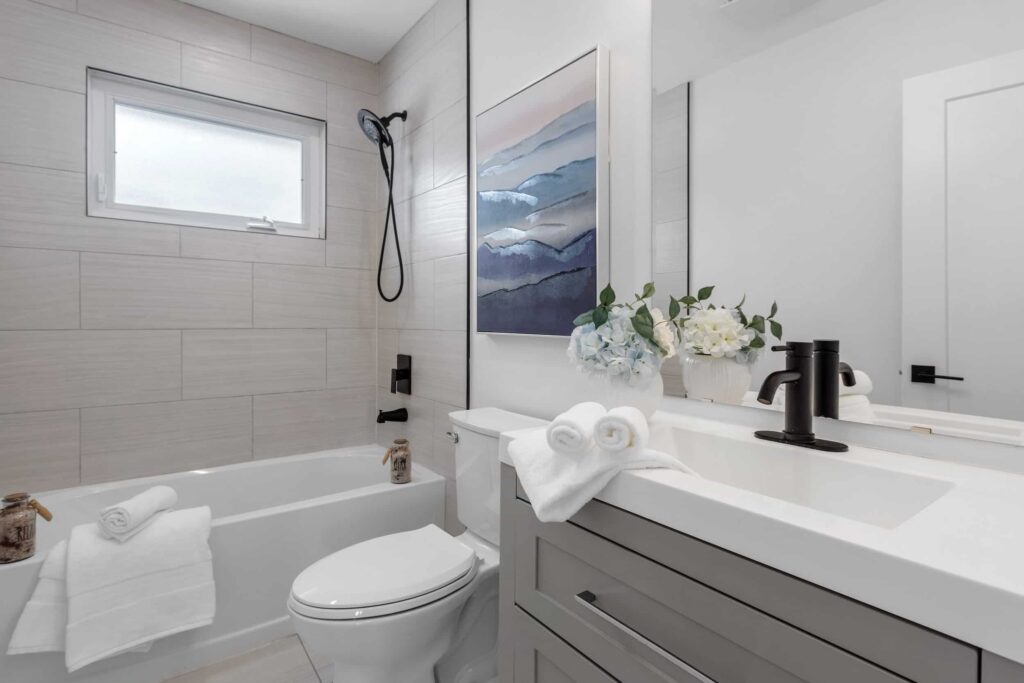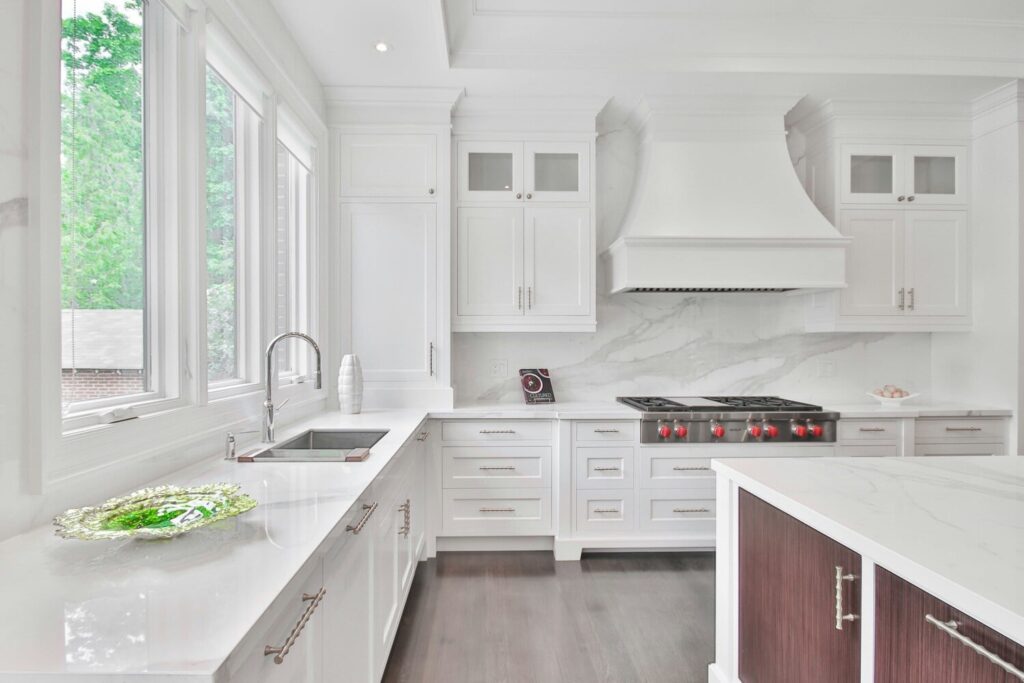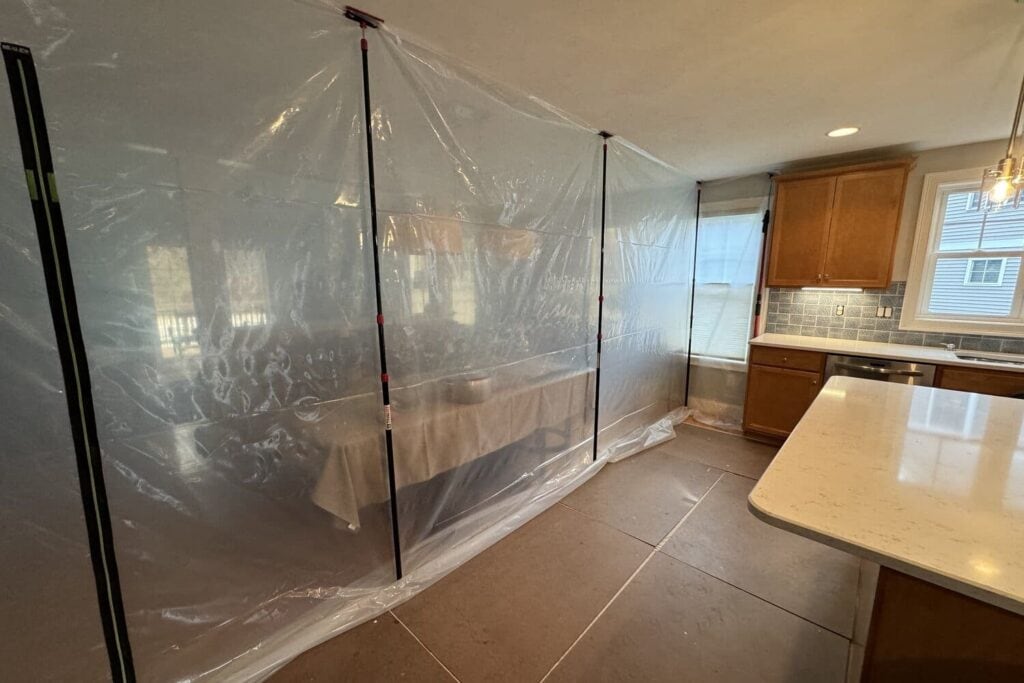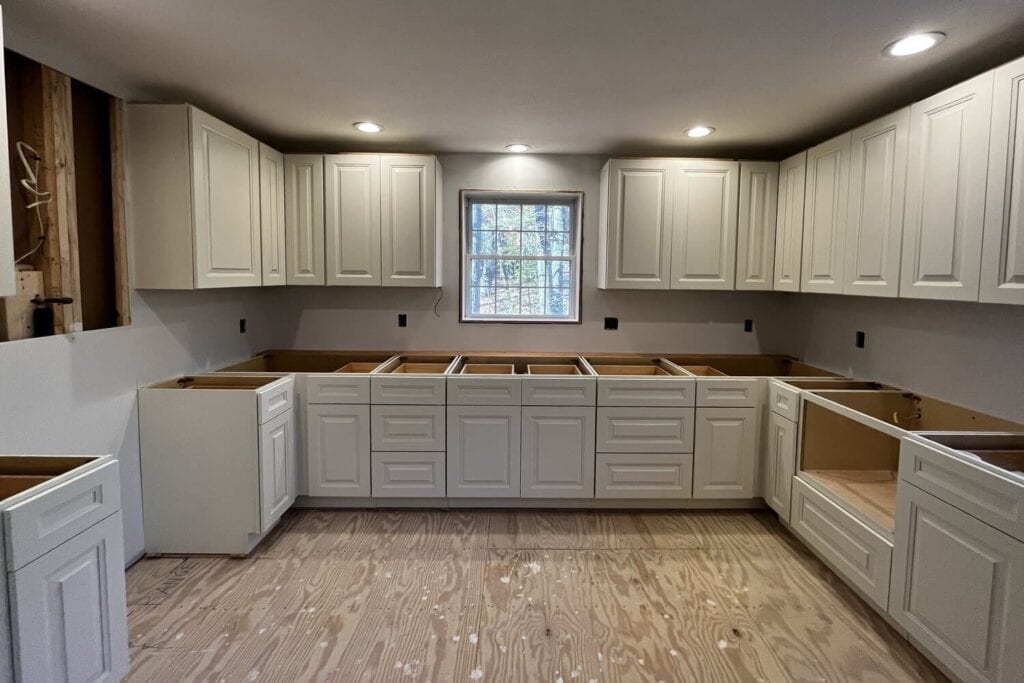There’s a moment when the decision to remodel your home goes from a fleeting thought to a real, tangible project. Maybe you’ve been daydreaming about a new kitchen for years, or maybe your bathroom has reached a point where no amount of scrubbing makes it feel fresh anymore. Whatever the reason, you’re ready to take the leap. But before you do, there are a few things you should know.
Home remodeling is exciting, but it’s also a significant investment—one that requires careful planning, a realistic budget, and the right team to bring your vision to life. The good news? When done right, remodeling your home can enhance your daily life, boost your home’s value, and give you a space that feels truly yours. The key is knowing what to expect before you start.
In this guide, we’ll walk you through everything you need to know before remodeling your home, from setting your budget to understanding the remodeling process and avoiding common pitfalls. Whether you’re planning a kitchen remodel, a bathroom renovation, or a whole-home transformation, we’ll help you feel prepared and confident as you move forward.
How do I start planning my home remodel?
Every successful home remodel starts with a solid plan. This isn’t just about picking out pretty countertops and stylish fixtures—it’s about understanding your needs, defining your goals, and setting realistic expectations. Here’s where to start:
1. Define your goals
Ask yourself: “Why am I remodeling?” Are you updating an outdated space, improving functionality, or increasing your home’s value? Maybe all three. Clearly defining your goals keeps you on track and helps you avoid pitfalls along the way.
2. Gather inspiration
Before meeting with a contractor, start collecting inspiration. Look at design magazines, Pinterest boards, and home renovation shows. Save images of kitchens, bathrooms, and layouts that speak to you. This will help your remodeler understand your style and preferences.
3. Consider how you live
Think about the way you use your home. If you’re remodeling your kitchen, do you cook elaborate meals or prefer quick and easy dinners? If it’s a bathroom remodel, do you want a spa-like retreat or a highly functional space? Your lifestyle should shape your remodeling choices.
4. Set a realistic budget
This is where things get real. It’s easy to get caught up in the excitement of a remodel and overlook costs. Understanding how much remodeling actually costs in the New Hampshire seacoast region will help you make informed decisions (we’ll cover this in more detail below!).
How much should I budget for my remodel?
Budgeting for a remodel depends on the type of project you’re planning. Here’s a general breakdown of remodeling costs in the New Hampshire seacoast region based on the level of remodel you choose.
Bathroom remodeling costs

Bathroom Renovation
A bathroom renovation is perfect for homeowners who want to refresh their space without major changes. This typically includes new flooring, updated fixtures, fresh paint, and a vanity or countertop replacement. A bathroom renovation typically costs between $15,000 and $30,000.
Builder-Grade Bathroom Remodel
A step up from a simple renovation, a builder-grade remodel includes completely gutting the space and installing new flooring, a standard tub or acrylic shower surround, a basic vanity, budget-conscious lighting, and fresh paint. This is a great option for homeowners looking for an affordable upgrade while keeping things functional. Expect to spend between $40,000 and $50,000 for a project like this.
Quality-Grade Bathroom Remodel
A quality-grade bathroom remodel offers upgraded materials and design choices without making structural changes. This typically includes a tile shower, custom tile flooring, a high-quality vanity, premium lighting, and upgraded fixtures. A quality-grade bathroom remodel generally falls between $55,000 and $70,000.
Full-Custom Bathroom Remodel
A custom bathroom remodel is a full transformation, often involving layout changes, structural work, relocating plumbing, and high-end material selections. Homeowners may opt for a spa-like tiled shower, heated flooring, a soaking tub, and custom cabinetry. These luxury remodels range from $90,000 to $250,000+, depending on size, scope, and finishes.
Kitchen remodeling costs

Kitchen Renovation
A kitchen renovation is the best choice for homeowners looking to refresh their space without a full remodel. This includes refinishing or refacing cabinets, updating countertops, replacing flooring, and installing new lighting. A kitchen renovation typically costs between $25,000 and $40,000.
Builder-Grade Kitchen Remodel
A builder-grade kitchen remodel is a practical upgrade with budget-conscious materials and finishes. It generally includes stock cabinetry, laminate countertops, vinyl flooring, and standard appliances. This type of remodel ranges from $50,000 to $70,000.
Quality-Grade Kitchen Remodel
A quality-grade kitchen remodel provides a more refined aesthetic with upgraded materials and features. Homeowners can expect semi-custom cabinetry, granite or quartz countertops, a ceramic tile backsplash, undercabinet lighting, and high-end appliances. These kitchens typically cost between $90,000 and $120,000.
Full-Custom Kitchen Remodel
A custom kitchen remodel is a full-scale transformation that includes layout changes, moving plumbing or walls, and installing premium materials. Custom cabinetry, high-end stone countertops, professional-grade appliances, and designer lighting complete the look. A custom kitchen remodel ranges from $120,000 to $300,000+.
How long does a remodel take?
The length of a remodel mostly depends on the project’s scope, but there are other factors at play, too. Here’s a general idea of what to expect:
- Kitchen Renovation: Typically takes 2-3 weeks, plus additional time for the design phase and permitting.
- Kitchen Remodel: Typically takes 5-8 weeks, depending on complexity and material availability.
- Bathroom Renovation: Typically takes 2-3 weeks, plus additional time for the design phase and permitting.
- Bathroom Remodel: Ranges from 3-6 weeks, depending on complexity and material availability.
Factors that can impact your timeline include material lead times, permit approvals, contractor scheduling, and unexpected structural discoveries once walls and floors are opened up. Supply chain issues or weather conditions can also play a role in delays. The best way to keep your remodel on track is to work with an experienced contractor who carefully manages scheduling, orders materials in advance, and communicates effectively throughout the project.
What’s it like to live in my home during a remodel?

Living through a remodel can feel like camping indoors—but with a little preparation, it doesn’t have to be stressful. Here’s what you should expect:
- Noise & dust: Construction creates a lot of noise, even with mitigation efforts. Dust can travel throughout your home despite containment measures, so consider sealing off rooms and using air purifiers.
- Limited access to spaces: If remodeling a kitchen, plan for a temporary meal prep area. If it’s a bathroom remodel, you might need alternative arrangements, especially if you only have one bathroom in the home.
- Disruptions to routine: Your home will feel different during the remodel. There will be workers coming and going, and you may need to adjust your daily habits to accommodate construction schedules.
- Pets & children: Consider how noise, dust, and restricted access will impact your family and make necessary accommodations for safety and comfort.
Setting clear expectations and having a plan in place will help ease the transition during the remodeling process.
What common mistakes do I need to avoid when I remodel?
Remodeling is a big investment, and while it’s exciting, it can also feel overwhelming. Every homeowner wants their project to go smoothly, but certain pitfalls can lead to stress, unexpected costs, or even regret. Here are some of the biggest mistakes to avoid so you can feel confident and in control of your remodel:
- Not setting a realistic budget: It’s easy to focus on the fun parts—picking out countertops, tile, and fixtures—but what happens when your contractor opens up a wall and finds water damage or outdated wiring? Unexpected issues are part of remodeling, so it’s essential to build in a contingency fund of at least 10-20% to handle surprises without derailing your project.
- Skipping the design phase: Remodeling isn’t just about aesthetics—it’s about function and flow. A well-thought-out design ensures that your new space not only looks great but also works for your lifestyle. Rushing into construction without a clear plan can lead to costly changes mid-project, which can cause delays and frustration.
- Hiring the wrong contractor: Choosing a contractor is one of the most critical decisions you’ll make. A lower bid might seem appealing, but it could come at the cost of experience, quality, or reliability. Look for a contractor with a solid portfolio, strong client reviews, and a reputation for delivering exceptional results.
- Ignoring permits and regulations: Cutting corners on permits might seem like a time-saver, but it can lead to major headaches down the road. Unpermitted work can result in fines, failed inspections, and even issues when selling your home. A reputable contractor will handle permitting correctly to ensure everything is up to code.
- Over (or under) customizing: It’s your home, and it should reflect your taste, but there’s a balance to strike. Going too niche with your remodel can limit resale value—what you love now might not appeal to future buyers. On the other hand, focusing too much on resale can lead to a space that feels generic and lacks personality. The goal is to create a home that brings you joy while maintaining broad appeal. Choose timeless design elements while incorporating personal touches that make the space uniquely yours.
- Trying to DIY complex work: There’s a difference between painting a wall and rewiring a kitchen. Some projects require professional expertise to ensure safety, quality, and longevity. Electrical, plumbing, and structural changes should always be left to experienced professionals to avoid costly mistakes and potential hazards.
Avoiding these common pitfalls will help ensure a smoother remodeling experience, fewer surprises, and a finished space that you love for years to come!
What should I expect from the remodeling process?

One of the biggest challenges homeowners face when starting a remodel is not knowing what to expect. A home remodel is an exciting journey, but it can also feel overwhelming if you’re unfamiliar with the process. Knowing what happens at each stage can help you feel more prepared and at ease.
1. Consultation & Design Phase
The first step in your remodel is the consultation and design phase. This is where you’ll meet with your contractor, discuss your vision, and determine what’s possible within your budget. If you’re working with a design-build firm like Rothrock Kitchen & Bath Remodeling, this phase will be highly detailed, ensuring that every element is planned before construction begins. From selecting materials to finalizing layouts, this stage lays the groundwork for a smooth remodel.
2. Permitting & Material Procurement
Once the design is finalized, it’s time to secure the necessary permits and order materials. This phase can take several weeks, depending on the complexity of the project and local permitting requirements. Certain materials, like custom cabinetry or specialty tiles, may have longer lead times, so patience is key. Working with an experienced contractor ensures that this phase is managed efficiently to prevent unnecessary delays.
3. Construction Begins
This is where the transformation starts to take shape! The construction phase begins with demolition, making way for new installations. From there, everything from plumbing and electrical work to drywall, flooring, and cabinetry installation happens in a carefully managed sequence. The length of this phase depends on the size and scope of your remodel:
- Kitchen renovation: 2-3 weeks
- Kitchen remodel: 5-8 weeks
- Bathroom renovation: 2-3 weeks
- Bathroom remodel: 3-6 weeks
Throughout construction, clear communication with your contractor is key. Expect regular updates and walkthroughs to ensure everything is progressing as planned.
4. The Final Walkthrough
Before the project is officially complete, you’ll do a final walkthrough with your contractor. This is your opportunity to ensure every detail meets your expectations. If any adjustments or final touch-ups are needed, they will be addressed at this time. A reputable contractor will ensure that everything is finished to the highest standard before considering the project complete.
5. Ongoing Follow-Up & Support
The remodeling experience doesn’t end the day construction is finished. At Rothrock Kitchen & Bath Remodeling, we believe in ensuring that your space continues to meet your expectations long after we leave. That’s why we check in multiple times over the following year—starting just days after completion, then again weeks and months later, with a final follow-up a full year later! This ongoing support gives you peace of mind, knowing that your investment is standing the test of time and continuing to function beautifully.
By understanding the remodeling process, you can approach your project with confidence, knowing what to expect at every stage. The right contractor will guide you through each step, keeping the process as smooth and stress-free as possible.
How do I choose the right remodeling contractor?
The contractor you hire will make or break your remodeling experience. Here’s what to look for:
- Experience & expertise: A contractor specializing in kitchen and bathroom remodeling will have the knowledge and skills to handle complex projects, from intricate tile work to custom cabinetry and plumbing adjustments.
- Attention to detail & planning: The best contractors don’t just do great work—they meticulously plan and proactively manage their projects, keeping everything running smoothly and on schedule.
- Transparency & communication: Your contractor should provide clear timelines, pricing, and expectations. Remodeling is a partnership, and you deserve a contractor who keeps you informed every step of the way.
- A strong portfolio: Ask to see examples of past projects to ensure their work aligns with your standards. A reputable contractor will be proud to showcase their craftsmanship.
Final thoughts: Is remodeling worth it?
Absolutely—when done right. A well-executed remodel can transform your home, making it more functional, beautiful, and enjoyable. But it’s important to go in with the right expectations, budget accordingly, and work with a trusted professional.
If you’re thinking about remodeling your home in the New Hampshire seacoast region, Rothrock Kitchen & Bath Remodeling is here to help. Our team specializes in high-quality kitchen, bathroom, and interior renovations designed to fit your lifestyle and needs.
Ready to take the next step?
Schedule a consultation with us today and let’s start planning your dream remodel!
